I sat on the beach in Bali, overwhelmed by the beauty of the volcanic black sand, the rising sun, and the surfers in the waves. The moment could not have been more perfect, if only it weren’t for the bottles washing up all around me, creating little white specs all along the sand as far as the eye could see.
Global warming is a debate people feel incredibly strongly about whether on one side or the other. All I can say for certain is that nearly everyone around the world who I’ve met talks about how there used to be abundance when they were young, and how things are changing, most notably the weather and native animals, as they grow up.
This is a sample size of those with higher education degrees and access to traditional media and published findings, and people who grew up in mountains disconnected from all of that, or fishing in oceans, and are simply relating observations they’ve made about the places that they know best.
In some ways this makes me desperate – how can we each do our part to be better to our planet? If you feel like I do, here are some ways to reduce your impact as a traveler:
1. Carbon Footprint
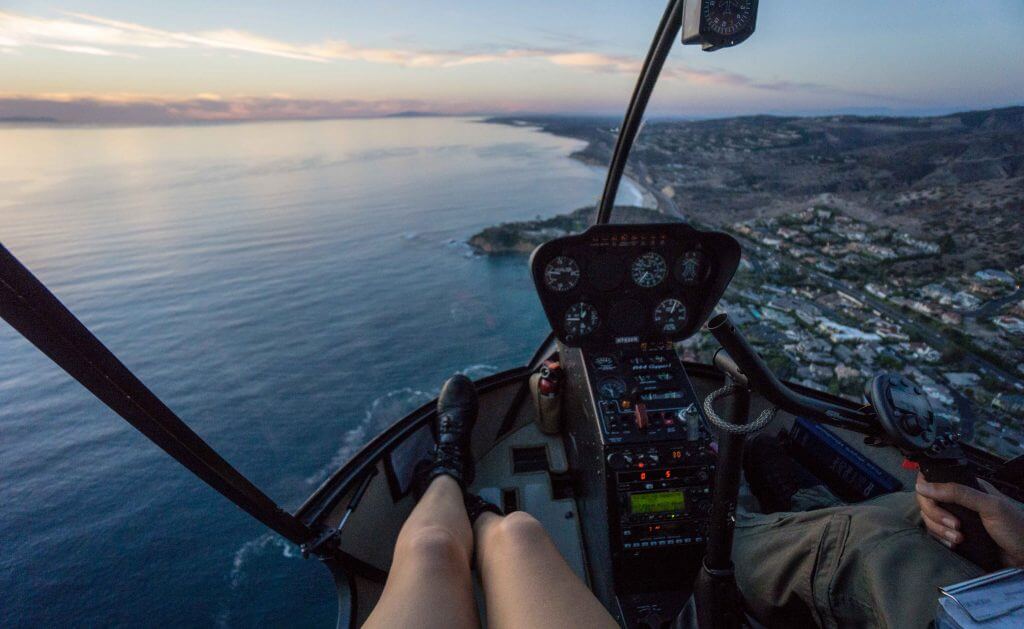
The most direct environmental impact travelers contribute is carbon footprint. According to a recent study, tourism contributes to 8% of global greenhouse gas emissions, with transport being the most significant contributor. As a long term traveler, I am most guilty about this. Every other week, I am leaving on an airplane to travel to somewhere; the car and cab rides add up, too.
A member of the BMTM Solo Female Traveler Facebook group spoke out about her dilemma of wanting to travel far out to see great places and experience different cultures, yet feeling guilty for the carbon footprint she contributes, especially since she typically only has a week to travel in the destination, which is the case for many Americans with only 15 vacation days per year. More people than ever are traveling – over 4 billion passengers flew on scheduled airline services in 2017, a record and a whopping 7.3% increase year over year. This is great news for the travel industry, bad news for the environment.
What can you do?
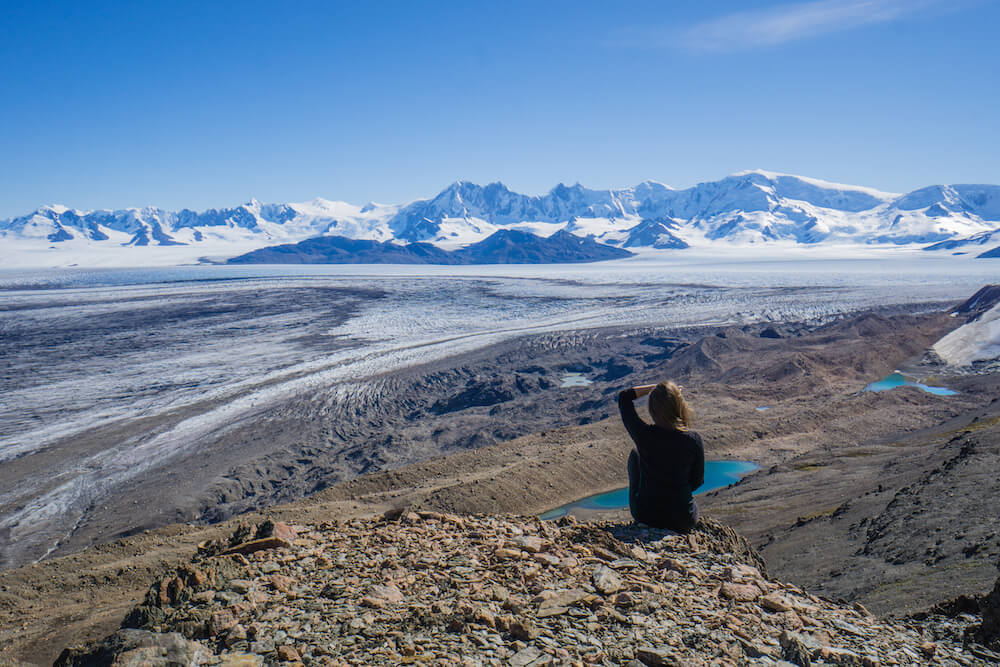
Offset your carbon footprint! Some members in the Facebook group suggested using the carbon footprint calculator where you can calculate the carbon footprint of your flight and offset it. I thought this was brilliant and I encourage you to check it out. On top of that, always opt for public transport instead of private taxis whenever possible, and try to explore the local neighborhood on foot or on bicycle -there are amazing people out there who travel around the world on a bicycle. These people have my highest respect for seeing the world in the most organic and ethical way. If you feel called to do the same, hats off to you!
Also if you can, travel longer. Now, I fully understand that not everyone has the flexibility to take long vacations, and some people may argue that the carbon footprint from that long flight is still the same regardless of length of stay. But if you can spend a longer time in a country, intercity traveling can be done on land public transport so you can minimize your carbon footprint within the country (i.e taking domestic flights).
Finally, the technology for biofuel-powered flights is ‘taking off’ – as consumers, can we be more vocal about our desire to see this become the norm?
2. Plastic
https://www.instagram.com/p/BrbjPErAPEK/
If you have been to Bali, India, or Bangladesh, it’s hard not to feel disturbed by the amount of plastic waste piling up by the roadside. In places where tap water is deemed unsafe to drink, many travelers opt for plastic bottled water, and dispose the bottle as soon as they are done. According to Forbes, a million plastic bottles are purchased every minute, out of which, less than 10% are recycled. It is also “estimated that over half a trillion plastic bottles will be sold in 2020”.
Half a trillion. The Earth is going to be covered in plastic bottles which take hundreds of years to decompose!
A trip to the local grocers, food markets, or shopping malls often see you returning to your hostel with a bunch of plastic bags to be disposed. In countries where the local businesses aren’t aware of the environmental impact of plastic usage and aren’t provided with alternatives, you might be given one automatically. Plastic bags are so overused it’s actually ridiculous if you start paying more attention to it. How many times have you seen a small pastry, already in an aluminium foil, being inserted in a plastic wrap followed by another plastic bag?
Don’t even get me started on plastic straws. Just watch this video.
What can you do?
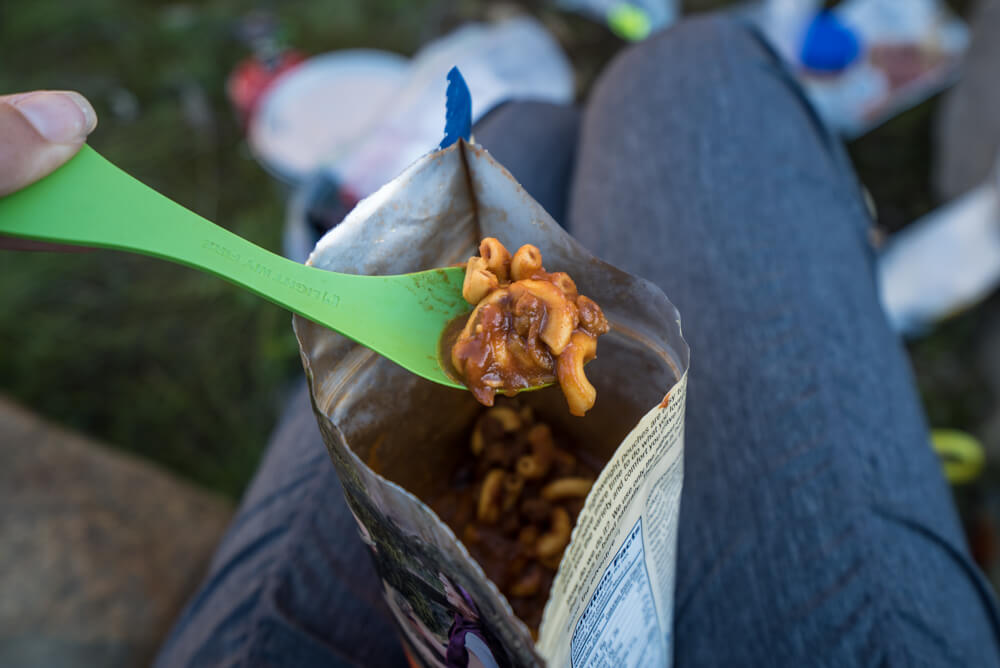
This is something I’m only recently starting to take action on – I bring my own cutlery, cups, and bags everywhere with me now. I admit it took me a while to do this, but after seeing my friend Alex being so diligent about using her own cutlery, cups, and straws in Austin, I realized how much I was wasting by not doing the same. Here are some ideas:
Want to stay hydrated? Bring a thermo flask and fill up at your hostel before leaving for the day. More and more restaurants and cafes provide drinking water which you can fill your bottle up with for a small fee. In some places like Iceland, Singapore, New Zealand, and Canada, tap water is perfectly safe for drinking – so drink away! In some places, filtering the water will make it safe to drink (just make sure it’s not coming out of lead pipes). If you have to buy a plastic water bottle, keep it for later reuse. If you are a caffeine addict like me, get a foldable coffee cup, it folds up real small which is always great especially when you are on the road.
Going shopping? Bring a canvas tote or a foldable shopping bag with you. I like the foldable shopping bags as they fold up small and really come in handy. If you are planning to visit many street food markets in your travels, consider bringing a container and your own cutlery with you. It’s much safer to use a container instead of plastic to carry hot food, anyway! Lastly, get yourself a bamboo or stainless steel straw – just be sure to make it clear to the waiter that you do not need a straw for your drink. I am guilty of forgetting that all the time!
3. Travel-sized Toiletries
It seems like the natural thing to do to drop by a drug store and buy a bunch of travel-sized toiletries to save space and luggage fees before a trip. However, did you know that based on a study carried out in the UK, 980 tons of travel-sized bottles have been dumped by British travelers in the last year alone? I couldn’t find a global study on this but I am sure the numbers would have been terrifying.
Hotels that provide toiletries in travel-sized bottles are also contributing to that number, as most hardly used toiletries get thrown out on a daily basis. At first thought, these tiny bottles may not seem like a big deal, and may not be the first thing people think of when the topic of travelers’ environmental impact comes up, but just the fact that there are more than 1300 million international tourist arrivals in 2017 alone, one can easily imagine the amount of travel-sized toiletries being disposed every day.
What can you do?
If you are staying in a hotel, either support hotels that have a proper recycling program, or simply bring your own toiletries and do not use the toiletries provided. I swear by these squeeze bottles that allow me to refill my toiletries, save space, and pack carry-on only in my long term travels. Better yet? Go solid! You can pretty much replace all of your liquid toiletries with shampoo bar, conditioner bar, and body soap bar, which may honestly be the best idea ever, as they are not only environmentally friendly, they also last much longer, and you no longer need to worry about leaking. This only concerns the ladies, but if you’ve never given DivaCup a try, now is the time. This environmentally-friendly feminine product for your period not only saves space and money (in the long run), and keeps you from putting chemicals in a place where they don’t belong, it also reduces waste. Win-win-win!
4. Trash
With exception of some countries like Iceland and Singapore, every country I have visited faces trash issues in one way or another. I remember walking into villages in parts of Southeast Asia and Central America to find kids playing next to mountains of trash, and it broke my heart. We all create trash, in one way or another, possibly more so when we are on the road, as we often do not have the luxury to hold on to things. Some countries simply do not have the resources to maintain proper trash management, so what can us travelers do when traveling in countries like this?
What can you do?
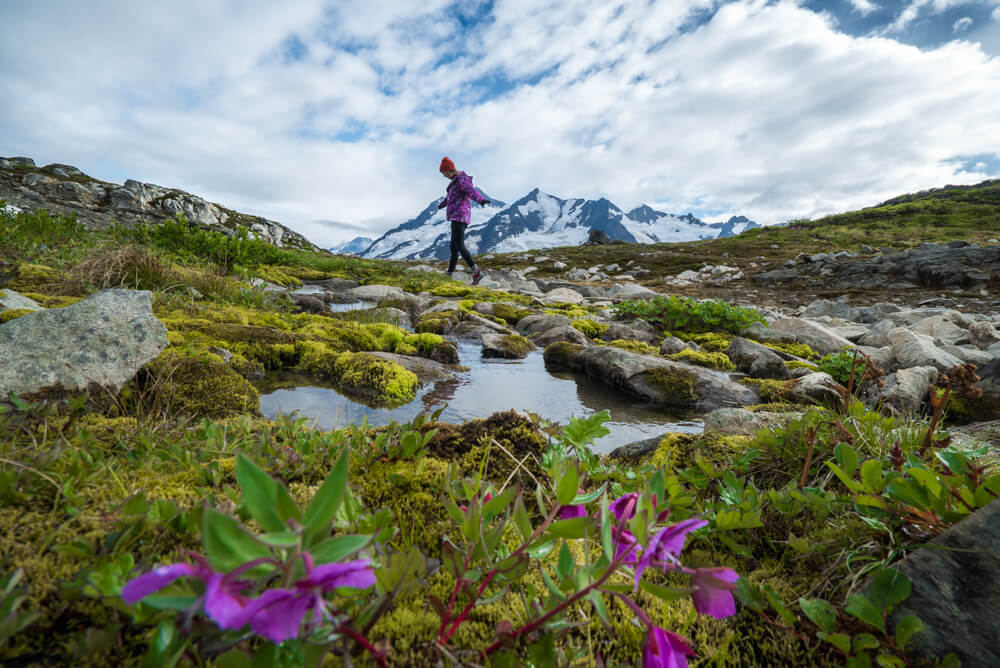
I’ll never forget a video (seriously I still think about it all the time) about a girl who went 5 years almost entirely waste-free. It really got me thinking – how often do I need to create trash? Can I use something I already have to carry something I purchase? Can I decline the receipt? Can I say I don’t need the napkin, the spoon, the tiny free bottle of water? Lately my biggest thing is trying to buy anything I possibly can secondhand instead of new – it stimulates the local economy and doesn’t generate new waste. I furnished my entire apartment that way previously.
I also try to buy clothing secondhand as well when possible. I do still buy new, but I am trying to minimize that. One of my favorite things to do is trade with other travelers. One girl’s dress she’s bored of could be my treasure for another year before I pass it on to the next girl. It’s fun, free, and creates no trash.
5. Food Waste
According to the United States Environmental Protection Agency, food waste is a significant contributor to global climate change. If you think that traveling has little to do with this, think again. A study by Wrap.org shows that hotels in the UK throw away over 20% of the food they purchase. Another study shows that over 46% of solid waste generated by hotels in Sri Lanka are food and non-recyclables. On top of that, self-service food points such as buffet restaurants, which are popular at hotels, allow their guests to take more than what they can eat. As a result, only about half of the food was actually consumed. All-you-can-eat? More like all-you-can-waste! If you tend to stay in hotels that provide buffet style breakfasts or are all inclusive, have you noticed how much food goes to waste because of greed?
Outside of hotels, local delicacies such as game meat in Africa, street food in Asia, and fast food in America can be hard to resist, and it’s only fair that you’d want to try them all. However, how many times have you over-ordered or end up not loving what you have in your bowl and left food behind? This is perhaps one of the very few downsides of being a solo traveler – wanting to try various items but not having someone to share your food.
What can you do?

Take only what you need. Be mindful when you fill your plate up at the hotel buffet. As for eating out, if you are traveling solo, chat with other solo travelers at the hostel and dedicate an entire day for food. That way, you can split everything, including the cost. If that doesn’t work out, consider packing your leftovers for later (this is why having a kitchen at your accommodation can be really beneficial).
Since we are on the topic of food, in a detailed study carried out by scientists, it has been proven that reducing (if not avoiding) meat and dairy consumption is the “single biggest way” to reduce your environmental impact from food. For this and other ethical reasons, I have decided to go on a plant-based diet and it has actually made my travels even more interesting, as I now make it a point to explore the vegan options available in the places I visit, such as Bali and New Orleans. Even if you are not a vegan, it is still fun to take one day off meat and dairy consumption to explore plant-based cafes and local markets for a unique, local experience. Also, I’m not perfect. I have had to eat meat a few times for lack of any other options, but it’s only been about once per month instead of once per day like I used to. I know that at least I’m making a difference.
6. Energy & Water
How can we use less energy, and especially water? Leaving the hotel room’s air conditioner on while you spend the day out exploring so you can come home to a nice and cool bed; filling the bathtub up every night so you can try out the bath bombs you’ve purchased, and asking for new towels, bed sheets and robes every day are things we probably would not do at home, so try to minimize them on the road, too.
Water typically accounts for 10% of the hotels’ utility bills. In some places like the Koh Phi Phi Don in Phi Phi Islands, there are only 2 fresh water ponds that act as the sources for piped water on the island. To put things into perspective, there are over 200 hotels and thousands of tourists on that very island. The water supply struggles to meet the tourists’ demand, especially during peak seasons.
What can you do?
…or rather, not do! Don’t do what you wouldn’t do at your own home – if you wouldn’t leave the electricity on when you are not home, don’t leave it on when you are not in your hotel room. If you do not replace your towels back home every single day, you do not need to do that at the hotel.
I would take it a step further, and truly consider how much water you use when you wash your hands, turn the faucet off when you brush your teeth. If you turn it on and leave it running for it to get hot, stick your refillable water bottle underneath to get the water that’s too cold to splash on your face, but perfect to drink (assuming it’s safe to do so). Soak dishes instead of running water over them for 10-15 minutes while scrubbing. Pay attention to every drop and I promise you’ll use less simply by being mindful.
Finally, the best thing we can do when we travel is to support local businesses or hotels with environmental programs. Always recycle what you use whenever possible, and if you’re in a place where you can’t recycle, take steps to reduce your waste generation, and lead by example for those around you. Every little bit helps, as does every caring person.
I want to emphasize that I hardly maintain anything like perfect adherence to these practices, and I’m not on a soap box sharing these recommendations, but I’m working more towards being a better citizen of Earth every day. I hope this article helps you to do more of the same.
What are some of your favorite ways to reduce waste abroad (and at home!)?
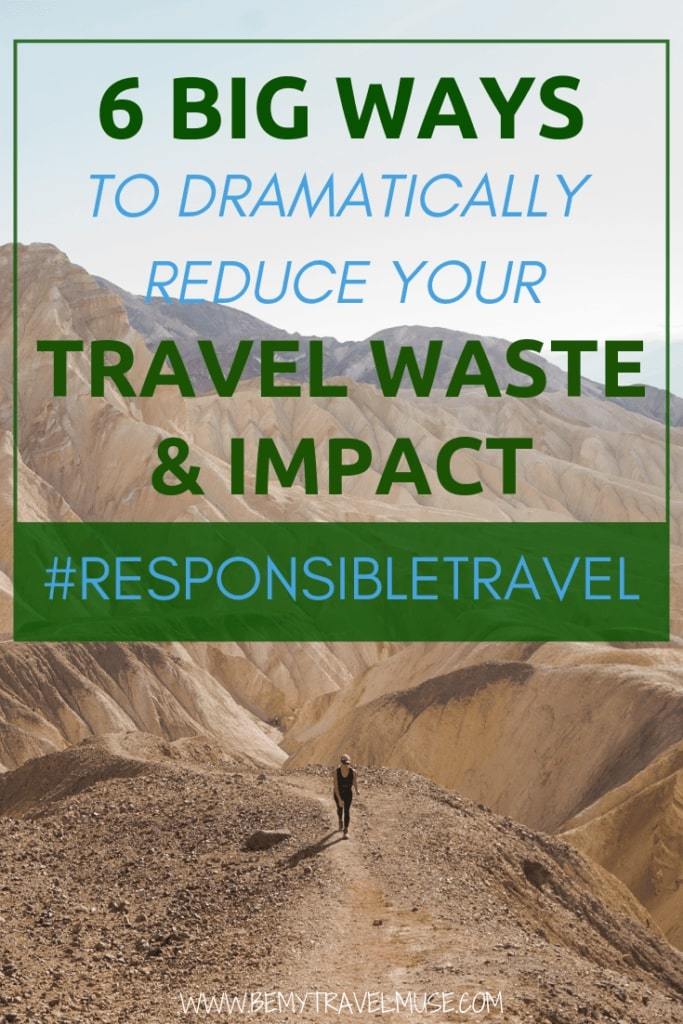
GG says
My favorite ways to reduce the waste I produce is through:
1. Taking all my hard to recycle waste (light bulbs, certain batteries, water filter for refrigerator, paint, worn shoes (they donate them for others in need to have shoes), hard to recycle glass and plastic etc.) to the facility in the city that can handle it rather than throw it out. Every city seems to have one or two facilities like this. Some of the really difficult items come with a nominal fee.
2. Purchasing a low emission vehicle. I need a car in the city I live in for now. Currently have one with efficient gas mileage (high miles per gallon) but hope to purchase an electric one the next go around. Even though electric vehicles impact greenhouse gas emissions due to power plants (even though much of the electric power here is natural gas, nuclear,, and even a touch of solar), the amount of impact is much less than a conventional vehicle plus it helps clean the air of hazardous pollutants that cause smog, and particulate pollution which is linked to many health problems.
3. Choosing to fly on airplanes that are newer, more energy efficient. If I can get the info and there is such an option, use a blend of biofuels. At this point, any amount of blend is better than none. There is a consortium of airlines dedicated to this cause. Admittedly for business, my options are limited.
4. When traveling for business, tub is not an option most of the time, but I have vowed to cut my shower lengths by 50% and frankly, be less wasteful with paper products including toilet paper (and flushing the toilet as a result).
5. Continuing to live a mostly meat free, low dairy diet: Am a pescatarian, but when I started, did not think of that, just a coincidence.
6. Working with food salvage programs. Have always been involved in food recovery programs and make sure every restaurant I patron has one.
7. Reducing sugar intake by 50%. Another one, not intentional. I did that for health reasons, but apparently the sugar production process is very water intensive, harmful to sensitive regions, so glad I could help with that even if just by chance! It is neat how it can be just that easy.
Thanks BMTM team though for making me think more about this. I have been pretty bad about this in recent years and being in this industry should walk the walk.
Many bloggers including many in the BMTM tribe are great about promoting ethical travel and list the methods to do so. However, kudos to your team on really doing the research here on top of the recommendations, citing the actual primary sources in some cases. It really says a lot about how much you not only value the environment, which is important to me, but also good work ethics and desire to provide great information to your readers/supporters who you clearly care very much for.
Don’t get too hard on yourself regarding flying. I think the carbon calculator is a great way to see how you can indeed offset some or all of that. I hope it makes you feel better about it plus you have to fly to travel the world. Living a low carbon footprint life like you have been trying to in every other aspect is telling me you are being a good environmental steward. If you use mass transit like you said especially using alternative fuels, not only are you benefiting yourself with your footprint reduction, it reduces congestion which reduces emissions indirectly which I doubt is counted in these things. Like you said, If everyone just thought about it, that often leads to some change, and every single person just even making a small adjustment in their lives (just like one act of loving kindness like no straws hurting turtles/tortoises, no plastic six-pack holders hurting ducks, or no plastic bottle caps hurting birds etc. ), can make amazing things happen.
Frédéric Paulussen says
This is such an awesome post! I must admit I don’t think about my waste too often.
I should definitely do it more, so I am going to follow this list!
For the carbon footprint, of course, it is hard to find “green airplanes”. I do have another tip of that which I have written about on my blog.
It is slow travel. Not going to places by airplane for just a couple of days but for longer periods, or taking alternative ways of transport. For example, I hitched a ride on a cargo ship once. It does an important economic route for the production of cars in Europe and is it possible to rent a room on their ships.
Other ways are taking the train, cargo-trains are even better, going by bike as I did once for a long trip. Although for the last one I can recommend you to wait until it’s full summer, instead of the start of spring. 😉
I think we can all think about things we can change to make less waste. Sometimes it’s more personal than global, but I think these tips of yours are a great way to start for everyone!
Cheers
Fred
Lindsey says
I love this! I came across your blog after looking into the speakers that will be at TravelCon and I’m stoked about the confidence you give travelers to do it by yourself. I love THIS post because I was just thinking on the way home from the grocery store about doing better about the little things when it comes to my environmental impact. My boyfriend is very conscious and has got us striving to buy solely what we can recycle, using reusable bags, riding to work sometimes, etc. But where I have only been contributing to these efforts, I’m finding myself wanting to do so much more. I want to search for the little things that can make a big difference if we’re all taking part.
I love your suggestions and look forward to implementing them into my travel!
The little things we try to do:
1) Only buy what can be recycled. If it can’t be, seek another option or just don’t buy unless it’s essential.
2) Wash less; I used to throw things into the washing machine after just one wear! Yikes! Not only does washing destroy your clothes faster, it uses a ton of water. We try to wear clothes that don’t need to be washed as often (anti-microbial, breathable, etc.)
3) Like you, trying to eat more plant-based meals!
Thank you for your inspiration, I’m excited to learn more!
-Lindsey
Kristin says
Kind of glad to know my laziness when it comes to washing clothes (unless they’re sweaty or undies of course) is a good thing!
squeakie pig says
Thank you for all these suggestions. They are fantastic! I travel a lot for work and always have foldaway bags and a spork on me, and I honestly use them daily. Also, if there is no recycling options for my waste (plastics, glass etc), but I know there is somewhere else (like home or the next leg of the journey) then I take it with me. You would be surprised how often I find myself on the train thinking, “is transporting my waste with me to somewhere else giving it more of a footprint?”… ahh the thoughts that go through our minds as we sit on the train. 🙂
But I always think there is more I could do, and some of these tips are ones I would never have even thought of. Thank you.
I also tend to keep an eye on kickstarter campaigns. They often have great ideas for environmentally friendly travel items. I’ve back ones for pocket-sized reusable cutlery (it has reusable chopsticks!! WIN!) and also a mini washbag for camping.
Kristin says
Thanks for the ideas! It’s a good one to go the extra mile, literally, to recycle.